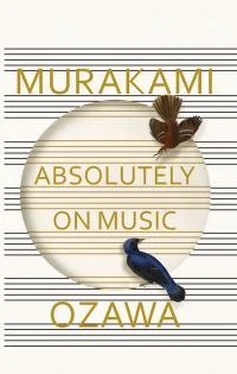MURAKAMI: You were pretty worked up, weren’t you?
OZAWA: I checked out and was getting ready to leave the hotel when the orchestra’s president, Rainer Zepperitz, a double-bass player and a man deeply trusted by Maestro Karajan, came with several other members of the orchestra to apologize. “Our behavior was inexcusable. Ever since you left, the percussionists have been working hard to master the part they were unable to play before. Won’t you please come to rehearsal once tomorrow, if only to see what kind of progress they are making?” Well, when they put it that way, I really had no choice but to go, don’t you think?
MURAKAMI: Yes, I guess so.
OZAWA: So I called Wilford again and said I’d give it one more day, and I had the hotel cancel the ticket. That was the one little drama I had. It was a pretty famous incident.
MURAKAMI: So did you perform Estancia, in the end?
OZAWA: We did. I went back and conducted it.
MURAKAMI: I bet Kleiber would never have gone back.
OZAWA: No, I’m sure you’re right! [ Laughter. ] In my case, though, the lack of direct flights to New York was a big factor.
MURAKAMI: They won you over while you were waiting for the transfer to be worked out. [ Laughter again. ]
OZAWA: By the way, Rainer Zepperitz was the lead double bassist in the Saito Kinen Orchestra for twenty-some years, from the time of its inception. I’m afraid he passed away just recently.
Murakami note: Estancia, op. 8, was originally ballet music composed by the Argentine Alberto Ginastera in 1941. It was Ginastera’s second piece for ballet, following his Panambi, op. 1 (1934–37), and can be viewed as one of his most representative works. Depicting the lives of the gauchos and others who live on the South American pampas, the work is rich in color. It was later refigured as a shorter suite (op. 8a), which is the form now most generally performed.
MURAKAMI: To get back to Kleiber’s Japan performance of La Bohème.
OZAWA: Right, right.
MURAKAMI: It seems to me that Carlos Kleiber is a conductor who at times can bring out a whole new pattern from even the most familiar compositions—the Brahms Second, for example, or the Beethoven Seventh—and give the listener a fresh sense of discovery, as if hearing for the first time something that was always hidden deep inside the music. There are lots of very fine conductors, truly gifted musicians, but there aren’t many who can do what he does.
OZAWA: Yes, I see what you mean.
MURAKAMI: I imagine that it takes a very deep reading of the score to accomplish something like that.
OZAWA: Yes, he was an incredible reader. The unfortunate thing for him was that his father was such a great conductor.
MURAKAMI: Erich Kleiber.
OZAWA: I think that’s what made him so nervous. It was pretty extreme. But he seemed to like me and always treated me with affection. I wonder why. He was also fond of Vera and was fairly chummy with her. He came to several of my concerts and bought me dinner on more than one occasion. When I was appointed music director of the Vienna State Opera, Carlos was the first to send me a congratulatory telegram—a very long one!
MURAKAMI: He sounds like a difficult character.
OZAWA: Oh, tremendously difficult. He was famous for his cancellations—he’d cancel at the drop of a hat. Later, he also gave me a call to congratulate me on my appointment, so I took the opportunity to ask him if he’d come to conduct in Vienna once in a while now that I was there. I mean, it was so hard to get him to come anywhere. So he said to me, “Hey, I didn’t send you that telegram because I was looking for an invitation!” [ Laughter. ]
MURAKAMI: Meaning, the two had nothing to do with one another.
OZAWA: I also invited him to conduct the Saito Kinen. He was definitely interested in the orchestra—enough to come to a concert we gave in Germany. But he wouldn’t commit himself one way or the other. I invited Maestro Karajan, too, when he was in his last years. I couldn’t get him to come, though. He was supposed to conduct the Boston Symphony for me. He had conducted the Chicago Symphony in Salzburg at Solti’s request. He said he couldn’t travel all the way to Boston, but he wouldn’t mind conducting the Boston Symphony if the orchestra ever came to Europe. He died, though, before we could make it happen.
MURAKAMI: That’s too bad.
OZAWA: He never gave me a clear answer as to whether he would conduct the Saito Kinen or not, but he did invite us to Salzburg. That time, I told him I would conduct one piece and leave another one for him, but I never got a clear yes or no from him. He passed away the following year. I’m sure he had already weakened considerably.
MURAKAMI: I wish I could have heard Kleiber or Karajan conduct the Saito Kinen!
OZAWA: Maestro Karajan was very interested in the Saito Kinen. Which is why he made it a point to invite us to Salzburg. It’s no easy matter to invite a whole orchestra to the Salzburg Festival!
Operas and Directors
MURAKAMI: Come to think of it, you told me there was once a plan for you to do an opera with Ken Russell directing.
OZAWA: Right, right. We were supposed to do Eugene Onegin in Vienna with Mirella Freni. This was before I moved to Vienna, when Lorin Maazel was still music director. I met with Ken several times to discuss it. But then, I don’t know what happened—there was a big fight with the opera house and he got out. I had nothing to do with that.
MURAKAMI: If it had come to fruition, I’m sure it would have been a wild production.
OZAWA: No doubt. His earlier Madame Butterfly had caused a lot of controversy with its big background photo of the atomic bomb exploding, a giant Coca-Cola bottle on the stage as a symbol of America … When I met him, he impressed me as a radical sort of person.
MURAKAMI: His movie Mahler was pretty far out.
OZAWA: Yes, he showed it to me back then. We met in some kind of club in the middle of London, a weird, dark place where only men were admitted. That’s where we talked. He said that in Pushkin’s original, the protagonist, Onegin, is portrayed as a more repulsive character. In Tchaikovsky’s opera, he is certainly weak and vacillating, but is not presented as the all-out womanizer he is in the original. Russell said he wanted to emphasize this dark side in his production.
MURAKAMI: I’ll bet that would have caused an uproar. [ Laughter. ] But anyhow, the project never happened.
OZAWA: No, that was the end of it.
MURAKAMI: It must be tough to choose a director.
OZAWA: The director I first teamed up with on Così fan tutte, Jean-Pierre Ponnelle, was truly wonderful. I still think of him as a genius. He understood the music so well! The first thing you do with an opera is to rehearse the bare music, without stage sets or anything, just piano accompaniment. But he pointed out to me that even then, the music would be more natural if the singers went through the gestures and movements they would be performing on the stage. This was my first experience with conducting a staged opera and a totally new discovery for me. So I asked him how he was able to do such a thing. He said he would listen to the music over and over until he became completely immersed in it. I’m sure he had a special understanding of music.
MURAKAMI: So he wasn’t one of those people who would crank out a stage set before he’s actually heard the music?
OZAWA: No, no, not at all. He and I were on the same wavelength. When I met him in Paris just before he died, we talked about doing The Tales of Hoffmann together. He was working on a new production of Hoffmann at the Paris Opéra-Comique, but he suggested we move it into a larger venue. I was all for it, but a short time later he died. It was such a shame! To me, he was truly a marvelous director.
Читать дальше











